Nursing pnn101 - Study guides, Class notes & Summaries
Looking for the best study guides, study notes and summaries about Nursing pnn101? On this page you'll find 33 study documents about Nursing pnn101.
All 33 results
Sort by
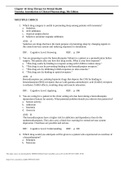
-
NURSING PNN101Chapter 03 to NURSING PNN101Chapter 22, Vislosky: Introduction to Clinical Pharmacology, 9th Edition
- Package deal • 17 items • 2022
-
- $35.49
- 1x sold
- + learn more
herapy for Mental Health ,Antivirals and Antiretrovirals,Drug Therapy for Central Nervous System, Drugs Affecting theRenal/Urinary and Cardiovascular ,Anti-infective Drugs: Antibacterial, Antitubercular, and Antifungal,Anti-inflammatory, Antiarthritis, and Antigout Drugs ,Physical Assessment question and answers,Hormones and Drugs for Osteoporosis
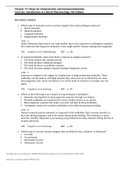
-
NURSING PNN101 Chapter 15: Drugs for Immunization and Immunomodulation Visovsky: Introduction to Clinical Pharmacology, 9th Edition
- Exam (elaborations) • 6 pages • 2022
- Available in package deal
-
- $8.49
- 1x sold
- + learn more
1. Which type of immunity serves to protect against day-to-day pathogen exposure? a. Innate immunity b. Natural immunity c. Acquired immunity d. Supplemental immunity ANS: A Innate immunity helps protect you from smaller day-to-day exposures to pathogenic organism but cannot provide long-term immunity to any single specific disease-causing microorganism. DIF: Cognitive Level: Remembering REF: p. 280 2. In acquired immunity, what is the body’s response to antigen exposure? a. The body...
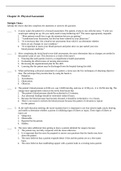
-
NURSING PNN101>Chapter 21. Physical Assessment question and answers
- Exam (elaborations) • 30 pages • 2022
-
- $8.49
- + learn more
Chapter 21. Physical Assessment Multiple Choice Identify the choice that best completes the statement or answers the question. ____ 1. A nurse wakes the patient for a focused assessment. The patient, trying to rest, tells the nurse, “I wish you would quit waking me up. Do you really need to keep bothering me?” The nurse appropriately responds: 1. “Most patients would love to get the attention that you are getting.” 2. “I understand your frustration, but this has been ordered by y...
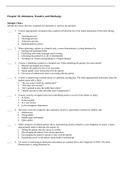
-
NURSING PNN101>Chapter 20. Admission, Transfer, and Discharge
- Exam (elaborations) • 21 pages • 2022
-
- $8.49
- + learn more
Chapter 20. Admission, Transfer, and Discharge Multiple Choice Identify the choice that best completes the statement or answers the question. ____ 1. A nurse appropriately recognizes that a patient will develop his or her initial impression of the nurse during the 1. Teaching process. 2. Discharge process. 3. Admission process. 4. Implementation process. ____ 2. When admitting a patient to a hospital unit, a nurse demonstrates a caring demeanor by 1. Smiling and speaking kindly. 2. Ex...
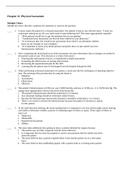
-
NURSING PNN101>Chapter 21. Physical Assessment question and answers
- Exam (elaborations) • 30 pages • 2022
- Available in package deal
-
- $10.49
- + learn more
1. A nurse wakes the patient for a focused assessment. The patient, trying to rest, tells the nurse, “I wish you would quit waking me up. Do you really need to keep bothering me?” The nurse appropriately responds: 1. “Most patients would love to get the attention that you are getting.” 2. “I understand your frustration, but this has been ordered by your physician.” 3. “It is necessary that I do a head-to-toe assessment from which I can determine whether there are any changes i...
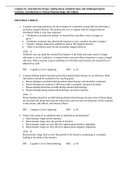
-
NURSING PNN101>Chapter 05: Anti-infective Drugs: Antibacterial, Antitubercular, and Antifungal Agents Visovsky: Introduction to Clinical Pharmacology, 9th Edition
- Exam (elaborations) • 12 pages • 2022
- Available in package deal
-
- $9.49
- + learn more
Chapter 05: Anti-infective Drugs: Antibacterial, Antitubercular, and Antifungal Agents Visovsky: Introduction to Clinical Pharmacology, 9th Edition MULTIPLE CHOICE 1. A patient receiving antibiotics for the treatment of a bacterial wound infection develops a secondary fungal infection. The patient asks you to explain why the fungal infection developed. What is your best response? a. “Antibiotics can upset the balance of normal flora and allow yeast or fungus to grow.” b. “Antibioti...
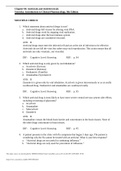
-
NURSING PNN101 Chapter 06: Antivirals and Antiretrovirals Visovsky: Introduction to Clinical Pharmacology, 9th Edition
- Exam (elaborations) • 9 pages • 2022
- Available in package deal
-
- $8.49
- + learn more
1. Which statement about antiviral drugs is true? a. Antiviral drugs kill viruses by altering viral DNA. b. Antiviral drugs work by stopping viral replication. c. Antiviral drugs alter the host immune system. d. Antiviral drugs are considered virucidal. ANS: B Antiviral drugs must enter the infected cell and act at the site of infection to be effective. Antivirals do not kill the virus but rather stop viral reproduction. This action means that all antivirals are only virustatic, not viru...
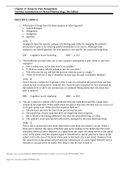
-
NURSING PNN101 Chapter 11: Drugs for Pain Management Visovsky: Introduction to Clinical Pharmacology, 9th Edition
- Exam (elaborations) • 6 pages • 2022
- Available in package deal
-
- $8.49
- + learn more
1. What types of drugs have the main purpose of relieving pain? a. Anticholinergics b. Antagonists c. Analgesics d. Agonists ANS: C Analgesics have the specific purpose of relieving pain either by changing the patient’s perception of pain or by reducing painful stimulation at its source. Although some analgesics are opioid agonists, the term agonist is not specific for a pain-relieving drug. DIF: Cognitive Level: Knowing REF: p. 213 2. The healthcare provider asks you to rate a patie...
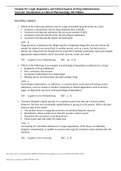
-
NURSING PNN101 Chapter 02: Legal, Regulatory, and Ethical Aspects of Drug Administration Visovsky: Introduction to Clinical Pharmacology, 9th Edition
- Exam (elaborations) • 5 pages • 2022
- Available in package deal
-
- $8.49
- + learn more
Chapter 02: Legal, Regulatory, and Ethical Aspects of Drug Administration Visovsky: Introduction to Clinical Pharmacology, 9th Edition MULTIPLE CHOICE 1. Which of the following scenarios may be a sign of possible drug diversion on a unit? a. A patient is dissatisfied with the drug administration schedule. b. A patient receiving oral antibiotics has an excess amount of pills. c. A patient is unaware that the nurse mixed a drug in applesauce. d. A patient receiving opioids reports increased...
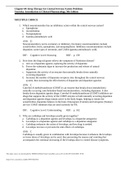
-
NURSING PNN101Chapter 09: Drug Therapy for Central Nervous System Problems Visovsky: Introduction to Clinical Pharmacology, 9th Edition
- Exam (elaborations) • 7 pages • 2022
- Available in package deal
-
- $8.49
- + learn more
Chapter 09: Drug Therapy for Central Nervous System Problems Visovsky: Introduction to Clinical Pharmacology, 9th Edition MULTIPLE CHOICE 1. Which neurotransmitter has an inhibitory action within the central nervous system? a. Epinephrine b. Acetylcholine c. Norepinephrine d. Gamma-aminobutyric acid ANS: D Neurotransmitters can be excitatory or inhibitory. Excitatory neurotransmitters include acetylcholine (Ach), epinephrine, and norepinephrine. Inhibitory neurotransmitters include do...

That summary you just bought made someone very happy. Also get paid weekly? Sell your study resources on Stuvia! Discover all about earning on Stuvia


